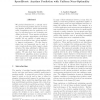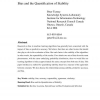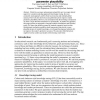149
click to vote
KDD
2012
ACM
13 years 4 months ago
2012
ACM
Accurate prediction of user behaviors is important for many social media applications, including social marketing, personalization and recommendation, etc. A major challenge lies ...
122
click to vote
JMLR
2012
13 years 4 months ago
2012
We present SpeedBoost, a natural extension of functional gradient descent, for learning anytime predictors, which automatically trade computation time for predictive accuracy by s...
146
click to vote
JMLR
2010
14 years 9 months ago
2010
Machine learning methods that can use additional knowledge in their inference process are central to the development of integrative bioinformatics. Inclusion of background knowled...
125
Voted
ICDM
2010
IEEE
15 years 1 days ago
2010
IEEE
Cold-start scenarios in recommender systems are situations in which no prior events, like ratings or clicks, are known for certain users or items. To compute predictions in such ca...
CORR
2002
Springer
15 years 1 months ago
2002
Springer
Research on bias in machine learning algorithms has generally been concerned with the impact of bias on predictive accuracy. We believe that there are other factors that should al...
117
click to vote
ARTMED
2004
15 years 1 months ago
2004
Successful secondary structure predictions provide a starting point for direct tertiary structure modelling, and also can significantly improve sequence analysis and sequence-stru...
113
click to vote
ESWA
2007
15 years 2 months ago
2007
Two parameters, C and r, must be carefully predetermined in establishing an efficient support vector machine (SVM) model. Therefore, the purpose of this study is to develop a gene...
122
click to vote
ICMLA
2008
15 years 3 months ago
2008
We revisit 26 meta-features typically used in the context of meta-learning for model selection. Using visual analysis and computational complexity considerations, we find 4 meta-f...
104
click to vote
ICMLA
2008
15 years 3 months ago
2008
We report on three distinct experiments that provide new valuable insights into learning algorithms and datasets. We first describe two effective meta-features that significantly ...
106
click to vote
EDM
2010
15 years 3 months ago
2010
Predictive accuracy and parameter plausibility are two major desired aspects for a student modeling approach. Knowledge tracing, the most commonly used approach, suffers from local...







